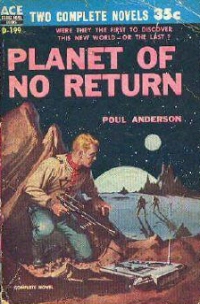"Planet of No Return" by Poul Anderson
In Anderson's tale, scientists from an overcrowded Earth have invented a warp drive and exploration of the galaxy has begun [the population in the story is 7 billion, a point we reached in 2011; that must have seemed catastrophic in 1952, when world population was about 2.6 billion], but explorers had found essentially no colonizable planets not already occupied by technological species. One promising world, Lagrange, had been visited by the survey ship De Gama, but they never reported back. Only by great effort could the private Lagrange Institute raise the funds for a follow-up/rescue mission. This story recounts that expedition and the events that befall it. I'll say no more about the plot in order to avoid spoilers.
Anyone who has read my reviews of other books and stories by Poul Anderson know that he my very favorite of all science fiction authors. Therefore I was getting a little disappointed and frustrated by the time I was about 2/3 of the way through this book and found that the plot seemed very linear and predictable, the characters were two-dimensional ethnic stereotypes (e.g., the one German in the expedition is a weapons expert, short-tempered and aggressive, and speaks in a heavy Sergeant Schulz accent), and the main protagonist was weak-willed and unlikable. I was ready to chalk this up to the fact that Anderson was still in the early phase of his work (his first story had only been published in 1947, five years earlier), and write this story off as having prototype elements of his later, more masterful works, but not being a very great effort in and of itself.
Luckily that changed in the last third of the book. Anderson throws in one massive plot twist, then just when you think you see where things are going, twists it right back orthogonally to the two previous plot trajectories. The characters, including the main protagonist Lorenzen, come into their own, and have a monumental decision to make. The end of the books is quite satisfying, but at the same time unresolved and leads the reader to speculation. Very artfully done. I still say the story is obviously not as well-crafted as Anderson's later works, but you can clearly see the raw talent for story and compelling details even at this early stage. (Jay, GoodReads)
Anyone who has read my reviews of other books and stories by Poul Anderson know that he my very favorite of all science fiction authors. Therefore I was getting a little disappointed and frustrated by the time I was about 2/3 of the way through this book and found that the plot seemed very linear and predictable, the characters were two-dimensional ethnic stereotypes (e.g., the one German in the expedition is a weapons expert, short-tempered and aggressive, and speaks in a heavy Sergeant Schulz accent), and the main protagonist was weak-willed and unlikable. I was ready to chalk this up to the fact that Anderson was still in the early phase of his work (his first story had only been published in 1947, five years earlier), and write this story off as having prototype elements of his later, more masterful works, but not being a very great effort in and of itself.
Luckily that changed in the last third of the book. Anderson throws in one massive plot twist, then just when you think you see where things are going, twists it right back orthogonally to the two previous plot trajectories. The characters, including the main protagonist Lorenzen, come into their own, and have a monumental decision to make. The end of the books is quite satisfying, but at the same time unresolved and leads the reader to speculation. Very artfully done. I still say the story is obviously not as well-crafted as Anderson's later works, but you can clearly see the raw talent for story and compelling details even at this early stage. (Jay, GoodReads)


Comments
Post a Comment